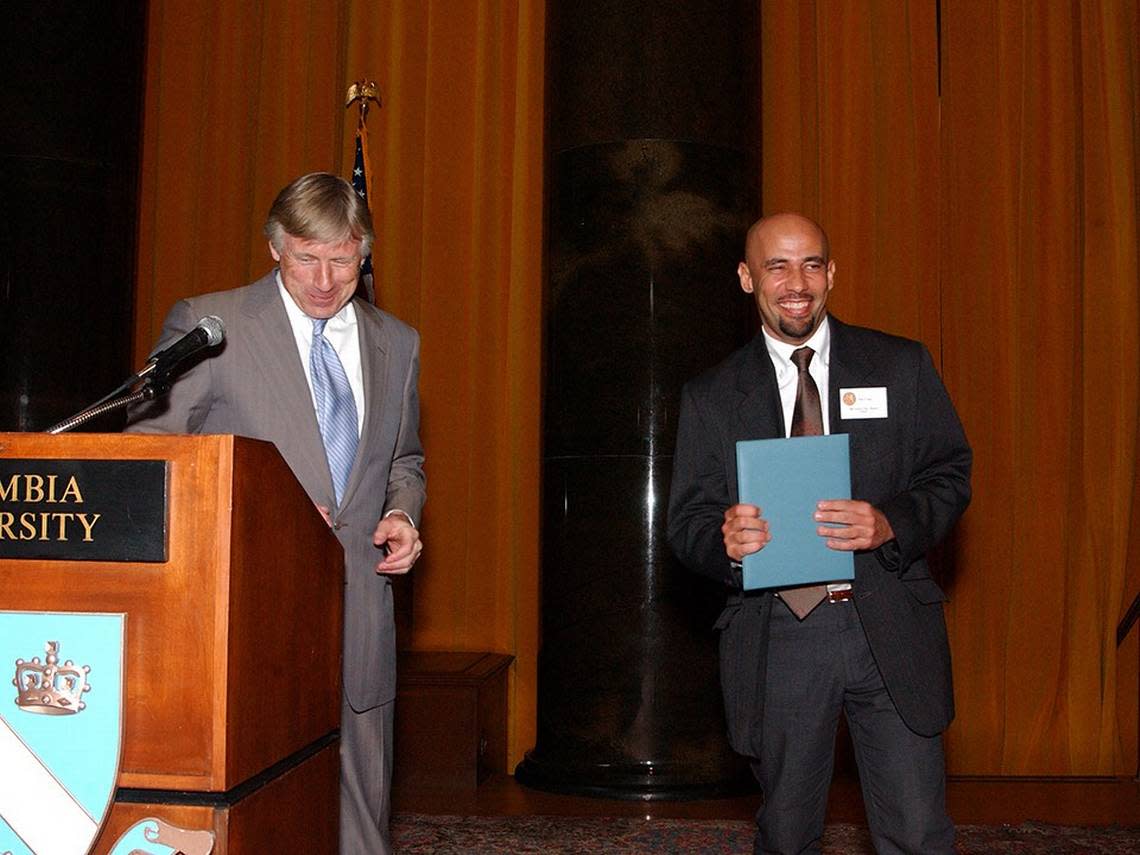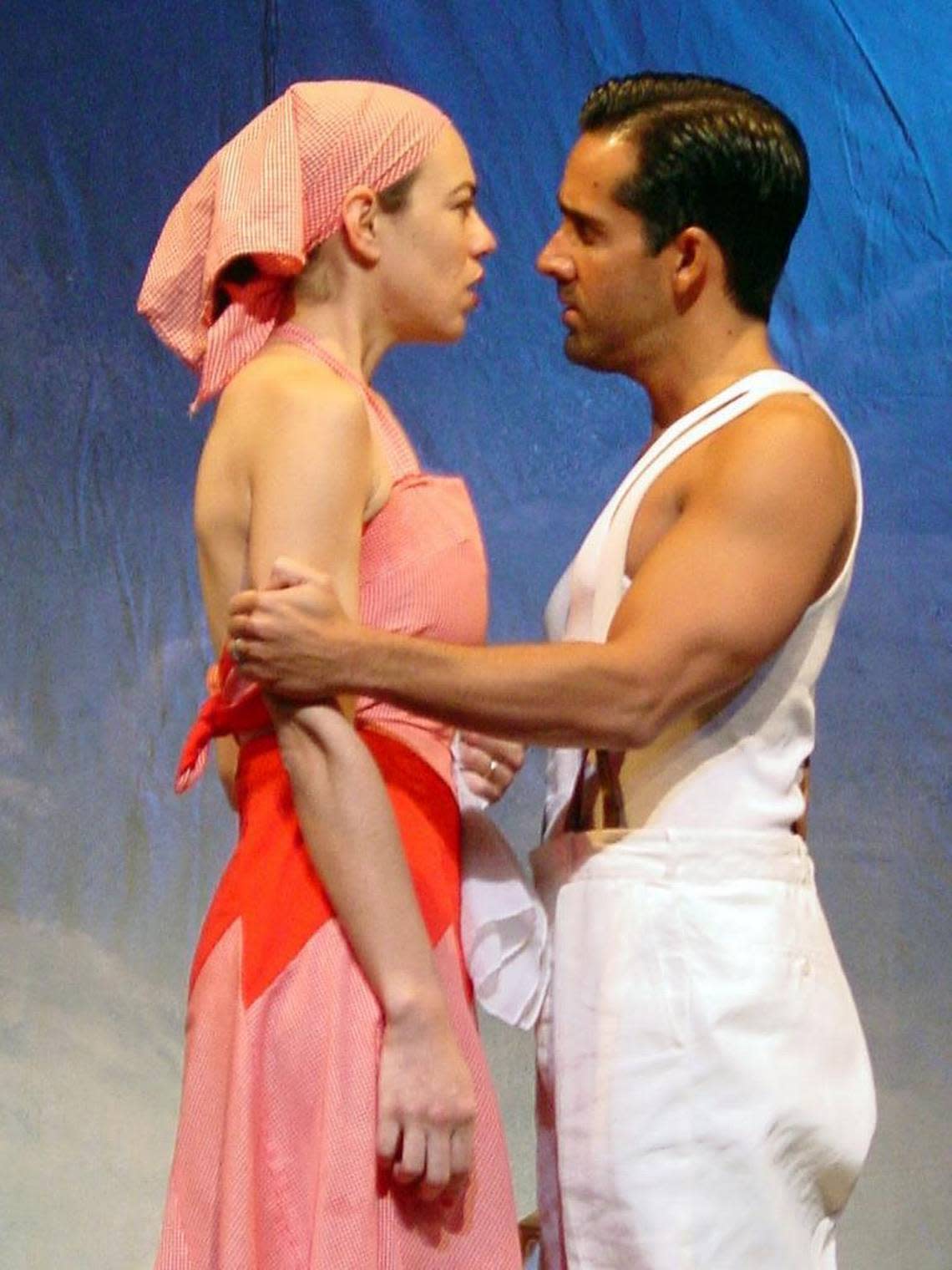Miami-Dade schools censor Pulitzer Prize-winning playwright, won’t let students see his play | Opinion
I told you, my fellow Cuban Americans, that the censors would get around to us, too.
And they have.
The same afternoon after the Miami-Dade School Board voted to suspend the district’s recognition of national LGBTQ History Month in October, school officials also quietly rejected — via email — the work of one of the most prominent Cuban Americans in U.S. cultural life.
Miami-Dade County Public School’s Division of Academics is refusing to allow high school students to attend — as they have in the past — Miami New Drama’s staging of Nilo Cruz’s Pulitzer Prize-winning work “Anna in the Tropics.” This year’s is the 20th-anniversary presentation of the play.
Why the rejection?
The school district’s not saying.
Is it because Cruz is gay? The district would never say that outright. But after the spectacle of last week’s School Board meeting, at which members were cowed into voting down recognizing LGBTQ History Month by hostile parents and un-Christian-like religious leaders — even the Proud Boys showed up — it’s not too far a leap in logic these days.
MDCPS students have been bused to see this stellar play before. The district should tell them — and the rest of us — what’s changed.
“My work has been staged around the world — and the only place where it has been censored is in Iran,” Cruz, 62, told me in an interview from his Miami home.
Until now — when the first Hispanic to win the Pulitzer Prize in drama, a distinction that, in 2003, also brought prestige to his hometown’s booming literary and theater scenes, appears to have become the latest victim of Florida Gov. Ron DeSantis’ culture wars.
“What’s happening in this city?” Cruz asks. “What’s happening in this country?”
His Miami story
Cruz’s success story is that of the quintessential anonymous hometown boy who leaves for the Big Apple and makes it big.
A native of Matanzas, Cuba, he’s the son of exiles who arrived on a Freedom Flight in 1970 and settled in a Miami neighborhood near the airport, where Eastern Airlines’ airplanes landed over the backyards.
From there, the family moved to Little Havana.
Cruz graduated from Miami public schools: newly integrated Melrose Elementary; Shenandoah, when it was a junior high and not a magnet school — and where he was bullied by two boys — and Miami Senior High School.
He was first exposed to theater through Shakespeare’s plays as a teen and he first studied theater at Miami Dade College, before moving to New York City to continue his higher education. He eventually became the celebrated Cuban-American playwright he is today.
In 2017, Miami-Dade County Public Schools, led by Alberto Carvalho, inducted him into its student Hall of Fame.
“Miami’s golden child,” Michel Hausmann calls the playwright. The Venezuelan-born theater director is co-founder of Miami New Drama, the resident company at the Colony Theater.

But now the same school district that honored him is keeping students from getting the chance to see — for free — the historic work that won Cruz the Pulitzer Prize. It will be performed Jan. 12 to Feb. 5, and Cruz will direct it himself.
The story is a moving one, set in 1929 Ybor City, where Cuban tobacco rollers were treated to literary readings as they worked — and, at least in his script, the love story being read by the lector, Tolstoy’s “Anna Karenina,” unleashes passions.
It’s a literary jewel, poignant and poetic, that speaks to the power of literature to move us and charts a historic time of change in Tampa’s immigrant Cuban cigar-producing community.
“It’s taught in high schools all over the country,” Cruz says. “The work has to do with immigration, with Cuba-U.S. traditions and the power of literature to change our lives.”

It’s difficult to think of another work that better suits Miami’s students of literature and the arts, but it seems as if public school officials, fearful of the ultra-conservative parents DeSantis has empowered and unleashed on them, have forgotten that their educational mission is to present students with learning opportunities, not to reject them out of political fear.
Are we in Castro’s Cuba and Maduro’s Venezuela now?
“This is their fear of not getting into trouble — and [they have] no problem violating my freedom of expression,” Hausmann said. “I lived this in Venezuela. The reason I had a falling out with the government was for calling things out. The situation is déjà vu for me.”
And, he added, “a slap in the face to Nilo.”
‘Chooses not to send students’
The timing of the rejection early Thursday afternoon is suspect.
In past years, this play and others have been shown for free to Miami public school students; the theater company has even paid for the students’ bus fare since massive cuts were made to public school art budgets.
The denial came out of the blue.
“Thank you for offering the opportunity, but MDCPS’ Division of Academics has reviewed the script for “Anna in the Tropics” and chooses not to send students to the performance at this time,” wrote Matthew Sabatella, curriculum support specialist.
Why?
The email, which I obtained, doesn’t specify.
Vyana Preti, the theater company’s director of education, wrote Sabatella back asking for an explanation and outlining the play’s literary merits: It contains classic literature and historical references and adaptation, is bilingual and is based in Florida. Poetic language is used as a vehicle for transformation.
“The opportunity to see the 20th-anniversary production of this play and have access to the artists and Cruz himself as director is invaluable,” she wrote. “As you can see, this play has a lot to offer to Miami-Dade’s young audiences. They will be able to see themselves and their families onstage. They will be able to envision themselves doing incredible things because this play was written by a student once seated in their same classroom.”
Sabatella, who is also a musician and not the person who made the decision, wrote back Monday that he was passing the concerns along to his supervisors.
I requested an interview Monday morning with Superintendent José L. Dotres. He answered in a text that the matter was being reviewed by the Division of Academics.
“Staff from Academics is addressing,” he texted.
Later Monday afternoon, media relations sent me this statement, standing by the rejection and citing age-appropriateness.
“It is common practice for District staff to review scripts prior to agreeing to send students to performances to ensure they are in alignment with performing arts standards and School Board policy. After thoroughly reviewing “Anna in the Tropics,” District staff determined that the script was not age-appropriate and ultimately, would not be a part of the Cultural Passport program.”
But “Anna in the Tropics” has been deemed appropriate for previous generations of students since 2003, ages 14+.
Age is the same excuse the Florida Legislature used to pass HB 1557, banning discussions of gender identity, allegedly for K-3 only, and now being widely implemented in schools throughout the state.
Michael Spring, director of Miami-Dade County’s Department of Cultural Affairs, minced no words expressing his support to Miami New Drama and Cruz.
“How very disappointing . . .,” he wrote in an email to Hausmann. “The recent news from the school system has been deeply discouraging, particularly in regard to the alarming message it sends about support and sensitivity to the important issues of inclusivity and diversity in a community that is defined by these values.”
Is being gay the issue?
Is the play being shunned by school officials because Cruz, who had a daughter with a longtime girlfriend in younger years, is gay?
Given that the School Board canceled the LGBTQ history commemoration, citing the state’s Parental Rights law — the “Don’t say gay “ measure — it’s a valid suspicion.
“Could it be because I’m gay? That I would like to know. The work has nothing to do with gender identity. But if that’s the path we’re walking . . . ” he says, pausing and leaving the sentence incomplete.
If it is so, the rejection would not only be blatantly discriminatory and outrageous, but also misguided.
“I’m not a gay writer,” Cruz added. “Some of my plays have gay characters. But I’m a writer, period. If there’s a running theme through my work, it’s the beauty of justice. The work speaks for itself.”
He adds: “I identify as an artist. An artist is already an outsider, and there are other complexities that come with me like, this child I made with this woman I love. We were together for a long time.”
He pauses again.
A human being wouldn’t have to declare all this were it not for the dangerous, dark times we’re living through in America.
Times, when even a beloved Pulitzer-Prize-winning hometown writer has to explain himself to the censors.
It’s sadly ironic that students, denied a lesson on the power of literature, are instead learning one about the power of prejudice in society.

